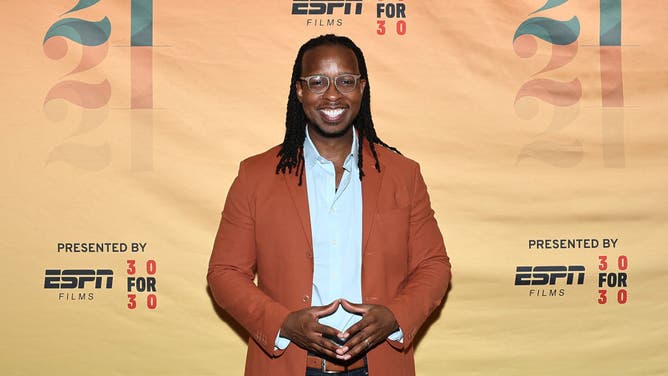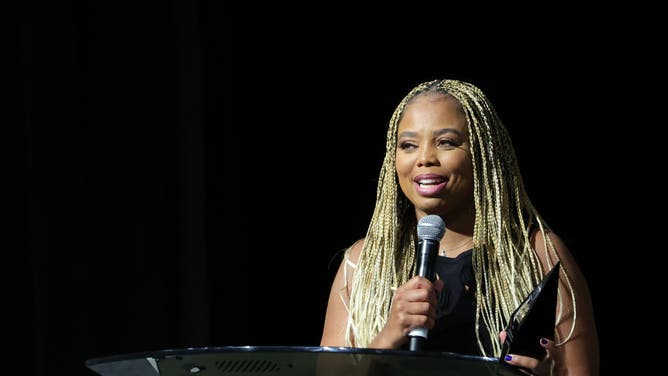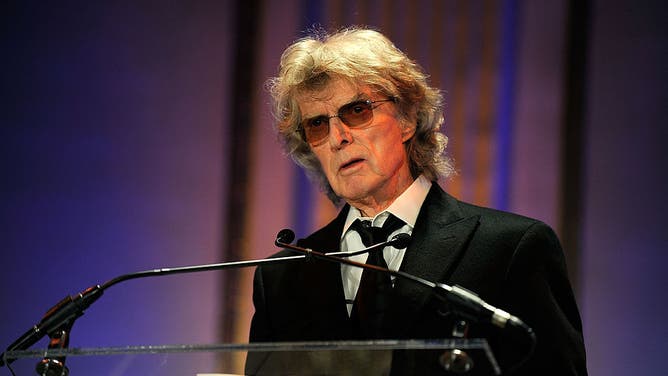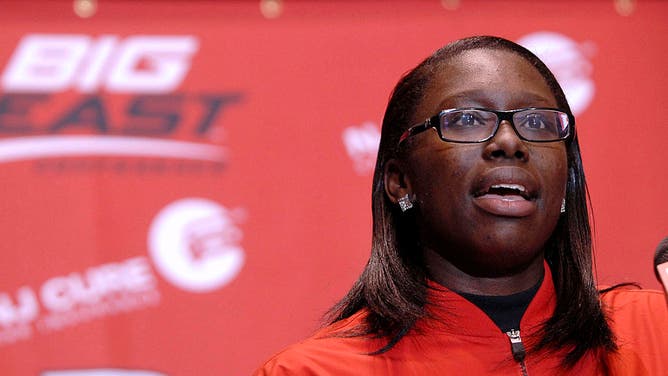ESPN, Ibram X. Kendi Documentary Says America Has Viewed Black Athletes As 'Animals' Since 'Day One'
Previously, OutKick reviewed the first four episodes of "Skin in the Game," a five-part docu-series produced by ESPN and starring Ibram X. Kendi (formerly known as Henry Rogers).
If you missed those, you can catch up here.
Additionally, if you were fortunate enough to not even know that ESPN partnered with race-hustler Ibram X. Kendi (a.k.a. Henry Rogers) for this project, you can read all about it here.
I'll wait for you to eagerly catch up on all the great content where ESPN tells you that you're inherently racist just for being an American.

Ibram X. Kendi partnered with ESPN to produce "Skin in the Game," a five-part docu-series that explains why sports are racist. (Photo by Arturo Holmes/Getty Images for MVAAFF)
OK, now that all of that is out of the way, we can move on.
As I said in the review of episode one, I care deeply about the OutKick audience, so I watched the entire show. I know you don't want to do that -- and, frankly, I didn't either -- but at least I got paid to do it. Though, to be fair, not nearly enough.
With that, we move on to the fifth, and final, installment...
"Highlights" from ESPN, Ibram Kendi's (a.k.a. Henry Rogers) fifth episode of "Skin in the Game"
Episode 5 title: "Out of Focus"
This episode focuses entirely on the racism of the sports media, mostly about the discussion surrounding black athletes. Shocker, I know. Hilariously, the show opens with a montage of sports broadcasters pointing out the "double-standard" for black athletes.
Of course, all of the voices in the montage -- Stephen A. Smith, Molly Qerim, Chiney Ogumwike -- work for ESPN. Thus, ESPN is going to explain how the sports media is racist against black athletes. Except, ESPN is the biggest name in sports media and they never stop defending black athletes -- even when they're wrong -- and putting down white athletes.
Seriously, I'm running out of way to call this entire project an exercise in hypocrisy. Although, ESPN might be right. The sports media does appear racist. Just not in the direction that they claim. But, as I wrote in the episode four review, racism is a one-way street.

Jemele Hill makes yet another appearance in the fifth episode of "Skin in the Game," an ESPN series starring Ibram X. Kendi, a.k.a. Henry Rogers. (Photo by Ethan Miller/Getty Images)
Kendi explains in the introduction that American society is racist, thus sports media coverage in America is inherently racist. Stop me if you've heard that before.
Quick sidebar: as I explained in the first episode review about Kendi, "There are conflicting reports on whether his birth name was Ibram Henry Rogers or simply Henry Rogers. Either way, he changed his name to Ibram Xolani Rogers and then married an actual doctor whose last name was Kendi and took her name."
So, Henry Rogers claims that America is so racist that black people get unfair treatment. Yet, he changed his name so that it sounded more traditionally African. After all, he had a nondescript name that a white person might have.
I've said this before and I'll say it again: I'm not a historian. However, I doubt you'll find many examples of Jewish people living in Germany in the early 1940s who changed their names to make sure people knew they were Jewish. If anything, they went the other direction. They wanted to hide their identity from actual oppressors.
If Kendi thinks black people are so oppressed by white people, why change his name? Why do many people with one black parent and one white parent simply identify as black? Perhaps, they realize that it's more advantageous to identify that way. Again, I don't think many German Jews found it "advantageous" to identify as Jewish in 1941.
ESPN documentary "Skin in the Game" and host Ibram X. Kendi (a.k.a. Henry Rogers) use Don Imus 2007 comments to punctuate point about racist media
The episode continues with luminaries like Jemele Hill explaining that there are too many white people in the sports media and that creates an "uncomfortable" dynamic for athletes. Then, Jessica Mendoza opines that the media marginalizes Latino athletes by lumping them all together rather than focusing on their exact country of origin.
Interestingly, the entire fourth episode of this series was about Latino baseball players and there wasn't much talk about their country of origin. Apparently, the racism only applies selectively. After all, the people in this series are all people of color. By definition, they cannot be racist.
Seriously, "antiracists" changed their definition of racism to include that the individual must be of the majority ethnic group or their behavior cannot be racist.
The episode then dives into the Don Imus controversy from over 15 years ago. Kendi invites one of the Rutgers basketball players, Essence Carson, onto the show. Once again, Kendi focuses on past issues as further proof that these problems still exist.

Former radio personality Don Imus. (Photo by Larry Busacca/Getty Images for AFTRA)
In this case, he uses an isolated incident by one individual to prove a point that generalizes all white sports media members. Which seems ... dare I say it? Racist?
Carson says that she couldn't believe that people didn't like her and her teammates because of their skin color. Except, again, this was a comment from one man who was infamous for saying controversial things for the sake of being controversial.
Then, the documentary shows clips of ESPN hosts attacking Imus and people protesting that he lose his job over the remarks. Unironically, one of the ESPN commentators says that it's abhorrent that Imus generalized an entire group of people based on appearance.
Hm, what must that be like? It's almost like saying every white person is a racist because of their skin color. Wait, no. It's exactly like that.
Imagine if this happened in reverse. Actually, you don't have to imagine. Earlier in 2023, the NBA suspended Ja Morant after he twice brandished firearms in public.
Stephen A. Smith went on ESPN and said, "I don’t want white America to think for one second that this is an example that you’re gonna use to shine a light on the collective problem on the black community and all this other stuff.”
Smith rightfully did not want an entire group of people labeled over the actions of one individual. Because that would be like saying Don Imus represents all white people. Fascinating how that works.

Essence Carson, Rutgers University's women's basketball team captain, speaks during a news conference regarding comments made by CBS radio host Don Imus. (Photo by Bradley C. Bower/Bloomberg via Getty Images)
Carson goes on to say that the worst part of the Imus commentary is that he thought there would be no repercussions since he was talking about black athletes and no one cares about them.
Except, all of his employers fired Imus for the comments -- including MSNBC, for whom he worked at the time. There was a TON of backlash and not just from black people.
Doesn't that prove the exact opposite of what Kendi and this documentary is trying to claim?
Carson even admits about Imus, "Boy was he wrong," in thinking that he could make those statements with impunity. So, why are we even talking about this 16 years later?
Before moving on, Kendi's guests also work some sexism into the conversation, because why not?
More "antiracists" join the panel in the ESPN documentary "Skin in the Game" with host Ibram X. Kendi (a.k.a. Henry Rogers) to talk about racism
Next up, the panel discussion! I keep hoping that the panel might eventually include someone with an opposing viewpoint, but alas, more of the same. ESPN contributor Scoop Jackson, sports editor Dave Zirin, and University of Oklahoma professor Dr. Cynthia Frisby are the "group-think" guests on this particular episode.
Guess where they all land, politically and socially?
I fail to see how gathering nothing but like-minded individuals for a five-part series that included over 25 different "voices" is productive. I put "voices" in quotes because really there's just one voice. And that voice yells "racism!" as often as possible.
Jackson starts the panel off with a doozy. When talking about the Imus comments (from 2007), Jackson says that his words "fit into the narrative of looking at black athletes ... as animals. In this country, that has been a thing since day one."
I'm not going to dignify his commentary with a response. I reported his comments. That's all I can muster on this ridiculousness.
The episode then turns to the racist caricature of Serena Williams that appeared in an AUSTRALIAN newspaper. The United States, by the way, condemned the image. It's interesting to use this example from a foreign country. But, again, when you don't have any actual examples, this is what you come up with.

Front page of the Herald Sun newspaper, featuring a cartoon of US tennis player Serena Williams (lower R), on sale at a newsstand in Melbourne on September 12, 2018. (Photo credit: WILLIAM WEST/AFP via Getty Images)
So far, we've had two examples of racism in sports media -- one from 2007 and one from Australia. Both perpetrated by singular individuals but used to disparage an entire group.
But, we're not done! Kendi decides to really prove that there's a "double-standard" between white and black. To do this, he points out that Kyrie Irving faced backlash and punishment for tweeting about an anti-semitic movie, while Jerry Jones faced no such backlash for a photo FROM 1957.
OutKick's Mark Harris did an excellent job explaining why this comparison is absurd, so there's no need for me to add to that.
ESPN and Kendi then use the Angel Reese-Caitlin Clark "controversy" as another shining example of this invisible "double-standard." I already elucidated on this when it happened.
Once again, the comparison holds no water. But as I keep having to explain, these are the examples you get when you have nothing of substance.
Ibram X. Kendi (a.k.a. Henry Rogers) eventually turns to Dave Zirin -- the only white guest in the entire series -- to ask him how he can help teach white people to not be racist.
Yes, that's who people need to learn from. Dave Zirin. He's the beacon of journalistic integrity.
Ready for some more delicious irony? Zirin explains the importance of elevating black voices in the sports media space.
Interesting. Earlier this year, Zirin called for NBC to fire Tony Dungy, a black member of the sports media, because he is pro-life.
You LITERALLY cannot make this stuff up.
On that hypocritical note -- which is the theme of the entire ESPN series "Skin in the Game" -- we conclude the review series.
I watched five episodes of "Everything is Racist" -- sorry, "Skin in the Game -- and reported what I "learned" to you, the audience, so you didn't have to watch it.
You're welcome.
Now, I'm going to make myself a nice, stiff drink.